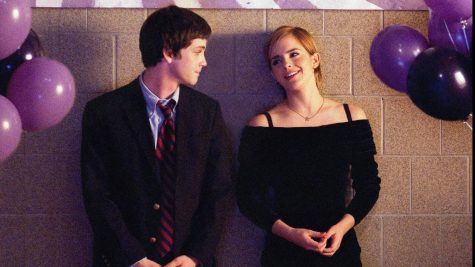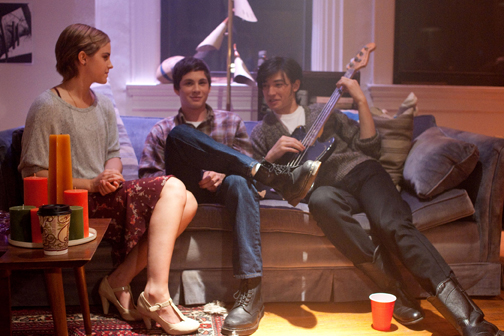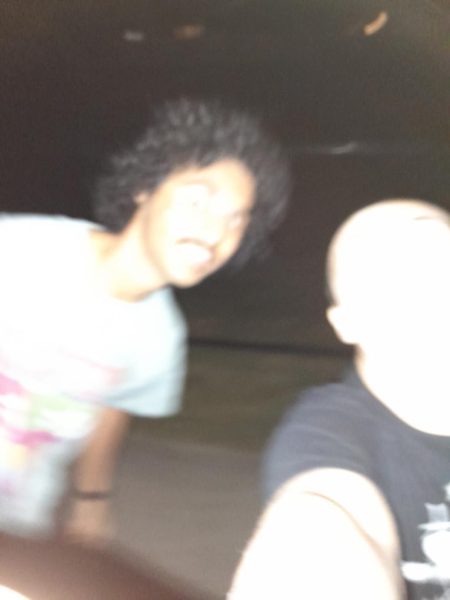The Perks of Being A Wallflower: The Power of Music in a Story
April 2, 2023
The Perks of Being a Wallflower by Stephen Chbosky is a book (and later, a film) about the high school experience (of the 90s). After watching the movie and going through the book (a relatively quick read might I add), I can attest to the fact that it is so much more than that (and that isn’t the teen angst speaking, well, no promises). The movie stars Logan Lerman as the shy, awkward protagonist Charlie while Ezra Miller and Emma Watson play Charlie’s closest companions Patrick and Sam (respectively).
What’s so special about it?
Although not a unique concept for a story (one can prove this by simply looking at a list of films that came out of the 1980s), how it’s done puts so much more of a focus on the struggles of those who don’t get to be a part of the story. It’s always about the jock, the nerd, the popular kid, or the weird kid. Charlie is closer to the weird kid than anything, but that doesn’t even do justice to the cliche-less nature of his character. He becomes defined as a ‘‘wallflower’’ within the group of friends that he finds himself with, but even they can be categorized into specific niches based on their interests. He is essentially the face of what it is to be a wallflower in the most literal sense: he blooms on the walls of prom parties, school dances, or hosted events, sipping away at his drink. In terms of the culture described, it’s closer to a movie like ‘‘Dazed and Confused’’ in light of the amount of drug and alcohol use, but even such is not treated as such a serious issue (even though it is concerning). Not in the movie at least, as the book takes a darker turn in the light of such a theme. The story’s main focus (especially exhibited within the movie) is that of relationships and mental health. Charlie faces several mental health issues that are all affected (and soon come to affect) most of his relationships (family, friends, acquaintances, teachers, etc.). If one is looking for a book to read that defines not only the peaks and fun times but also the grimy and sharp moments that define mid-late adolescence, this is the best you can get.
The Music in the Film
Aurally speaking, the music is the best part of the film. Ms. Keenan called the film an ‘‘MTV version’’ of the book, and even while I like the movie a little more than the book, that is simply the most accurate description one can assign, for both good and bad. The movie’s soundtrack is what you’d hear when you turn on MTV (at least during the period of the movie). Songs by Sonic Youth, The Smiths, David Bowie, and even Dexys Midnight Runners (‘‘Come on Eileen’’ ). They define scenes and give so much meaning in the context of the situations in which they are played, especially the song ‘’Asleep’’ by The Smiths (which won’t be spoiled here, but if you know, you know). The bad side of the ‘‘MTV’’ claim is the more lighthearted nature the movie has in comparison to the book’s darker events. The story is generally the same, but much is watered down, and much of what is indeed watered down are some of the more dark experiences that Charlie goes through. But, if you’re simply looking for a film to entertain yourself while also acting as a comfort of sorts, this is the one.
The Music in the Book
Musically speaking, the book goes more in-depth in terms of the music discussed, as Nick Drake, The Beatles, Simon and Garfunkel, Nirvana, Fleetwood Mac, The Doors, and some others are mentioned or used as plot devices (such as when Charlie made a mixtape for the Secret Santa party). Music is not simply just mentioned for the sake of mentioning it. It is a catalyst for the story’s themes, as ‘‘Something’’ by the Beatles is utilized as the main focal point of the romanticism between Charlie and Sam while ‘‘Heroes’’ by David Bowie exemplifies the sense of freedom and true friendship that Charlie was looking for and found within his friends. The discussions that took place in ‘‘Big Boy’’ (a local diner Charlie and his friends go to) that are rooted in music expand the dynamic of the group’s friendship in terms of polarizing attitudes, speaking contributions, mediation, and other such factors that go into a conversation. It’s these smaller things that fully wrap the reader into the story, feeling as if you’re there with Charlie and his friends. Feeling his pain, his sadness, his anger, his joy, his excitement, his gratitude. The family experiences are painfully relatable, the attempt to fill ‘‘space’’ with meaningless actions hurts, and ending up committing to things solely to please the receiving end is dreadfu. On the other end, seeing your relatives and friends go up to graduate, sharing memories with your closest friends, and finding parental comfort in a time of dire need of it all allow for a warm flow of emotions to be experienced in the most direct way possible. All that revolves around these moments, more often than not, is music and the themes found within these songs that truly reflect the situation or sentiment of the moment. Filmmakers and authors alike should strive for such an interweaving implementation of music not simply for music’s sake, but for the sake of the plot, characters, mood, emotion, and what it may foreshadow (and not in such an obvious way that makes me want to puke either).



